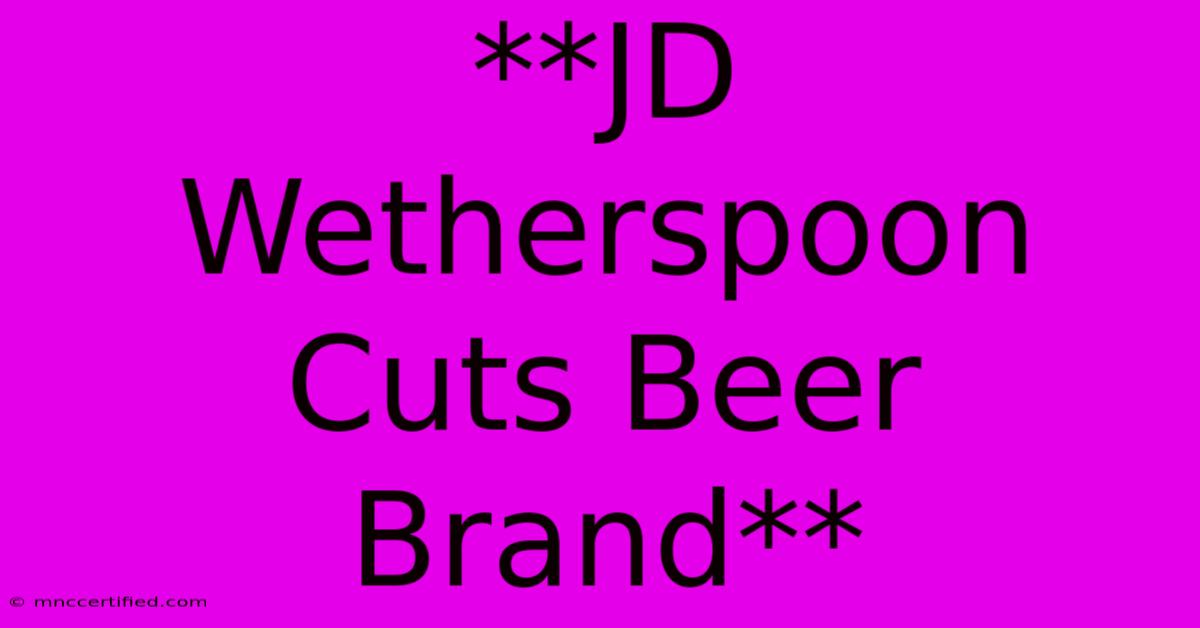**JD Wetherspoon Cuts Beer Brand**

Table of Contents
JD Wetherspoon Cuts Beer Brand: What Does it Mean for Pubgoers?
JD Wetherspoon, the UK's largest pub chain, has made headlines recently for dropping a popular beer brand from its menu. This move has sparked discussion among pubgoers and industry experts alike, raising questions about the future of the pub giant's beer selection and its impact on customer preferences.
The Beer Brand in Question: A Popular Choice for Pubgoers
While Wetherspoon has not publicly confirmed the specific brand being cut, reports suggest it is Carling, a widely popular lager brand in the UK. This choice is particularly surprising given Carling's longstanding presence in Wetherspoon pubs and its popularity among pubgoers.
Reasons Behind the Decision: A Shifting Landscape for Beer?
The decision to drop Carling, or any other brand, is likely rooted in a combination of factors. Some speculate that rising costs and supply chain issues could be contributing to this move. Wetherspoon may be looking to streamline its beer portfolio, focusing on brands that offer better value for money or are more readily available.
Furthermore, the move could reflect a broader shift in consumer preferences, with more drinkers opting for craft beers, local brews, and premium options. Wetherspoon may be seeking to cater to these evolving tastes by offering a more diverse selection of beers.
Potential Implications for Wetherspoon and Pubgoers
The removal of Carling, if confirmed, could have significant implications for both Wetherspoon and its loyal customers.
For Wetherspoon:
- Increased competition: This decision could potentially lead to increased competition from other pub chains that continue to offer Carling.
- Loss of loyal customers: Some customers who specifically visit Wetherspoon for Carling may be disappointed and choose to frequent other pubs.
- Impact on brand image: This move could be perceived as a sign of Wetherspoon's commitment to evolving with the times or, conversely, as a disconnect from its traditional pubgoer demographic.
For Pubgoers:
- Limited choices: Removing a popular brand like Carling could leave pubgoers with fewer choices, particularly those seeking a classic lager.
- Higher prices: Replacing Carling with other premium or craft beers might lead to higher prices for pubgoers.
- Loss of a familiar brand: The absence of a long-standing brand like Carling could create a sense of nostalgia and change the pub experience for some customers.
Moving Forward: What's Next for Wetherspoon?
It remains to be seen whether this decision signals a larger shift in Wetherspoon's strategy. The pub chain has been known for offering a wide range of beers at competitive prices, and it will be interesting to see how they navigate the changing beer landscape.
The decision to drop a popular brand like Carling is a bold move that is sure to be met with mixed reactions. Only time will tell whether this decision will prove to be a successful strategy for Wetherspoon and how it will impact the pub-going experience for customers.
Keywords: JD Wetherspoon, Carling, beer brand, pub chain, pubgoers, beer selection, consumer preferences, craft beer, local brews, price, competition, brand image, pub experience.

Thank you for visiting our website wich cover about **JD Wetherspoon Cuts Beer Brand**. We hope the information provided has been useful to you. Feel free to contact us if you have any questions or need further assistance. See you next time and dont miss to bookmark.
Featured Posts
-
2 5 Hour Uk Getaway Christmas Markets Budget Friendly
Nov 13, 2024
-
Assisted Dying Bill Leadbeater Details Safeguards
Nov 13, 2024
-
Valiant Newsletter Prepare For Home And Away
Nov 13, 2024
-
Oweh Leads Kentucky Past Duke 77 72
Nov 13, 2024
-
Kriisa On Flagg No 1 But We Won
Nov 13, 2024